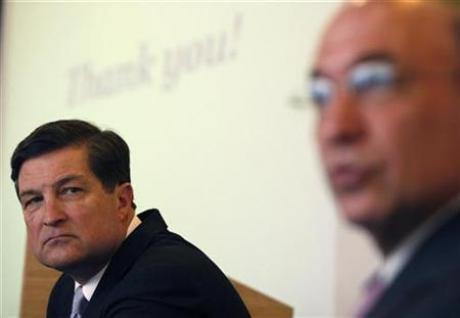Lacker says Fed's new easing push too risky

Richmond Federal Reserve Bank President Jeffrey Lacker (L) attends a conference at Hebrew University in Jerusalem November 3, 2008.
Credit: Reuters/Baz Ratner
By Pedro Nicolaci da Costa
RICHMOND, Virginia | Sun Nov 14, 2010 9:40pm EST
(Reuters) - Richmond Federal Reserve President Jeffrey Lacker indicated on Sunday he opposed the central bank's new round of monetary easing, saying he believed the policy was potentially dangerous and likely ineffective.
The Fed announced earlier this month it was pumping an additional $600 billion into the economy via purchases of long-term government bonds.
"The decision has been made. I was one who thought the risks exceeded the benefits," Lacker told reporters after a speech at the regional central bank's headquarters.
Lacker, a vocal inflation hawk, said in a speech to economics teachers at the regional central bank's headquarters that monetary policy can lower joblessness only temporarily.
"Trying to keep unemployment permanently lower than it otherwise would be … is a recipe for continually accelerated inflation," he said, pointing to the inflation experience of the 1960s and 1970s as a cautionary tale.
With the jobless rate currently stuck at 9.6 percent and inflation running below the Fed's implicit target of 2 percent or a bit below, the Fed felt compelled to act, delivering another dose of monetary accommodation.
During the financial crisis of 2007-2009, the central bank had already lowered interest rates to effectively zero and bought some $1.7 trillion in government and mortgage-related securities.
The Fed's latest round of bond-buying is an attempt to lower borrowing costs even further and spur ending, which officials hope will also boost hiring.
NO DOLLAR MANIPULATION
Lacker said the notion, proclaimed loudly by many economic leaders overseas since the Fed's early November decision, that the Fed is easing in order to actively weaken the U.S. dollar and boost exports is misguided.
"To say that this is aimed at reducing the dollar is unfair," he said. "To call it manipulation is grossly unfair."
However Lacker, who is not a voter this year on the Fed's policy-setting Federal Open Market Committee, remained suspicious of trying to address the economy's current problems through even lower borrowing costs.
"At some point in the not-too-distant future, we are likely to face an economy growing in a self-sustaining way while the unemployment rate is still relatively high by historical standards," Lacker said. "The decisions we make at that time will be the true test of whether we've learned our lessons."
The Fed's bloated balance sheet, a direct product of its policy of asset purchases, has raised concerns about the Fed's ability to orchestrate a smooth exit.
Lacker added that the Fed has the tools it needs to withdraw monetary stimulus when the time is right.
"The tricky part is figuring out when and how fast," he said.


 留言列表
留言列表